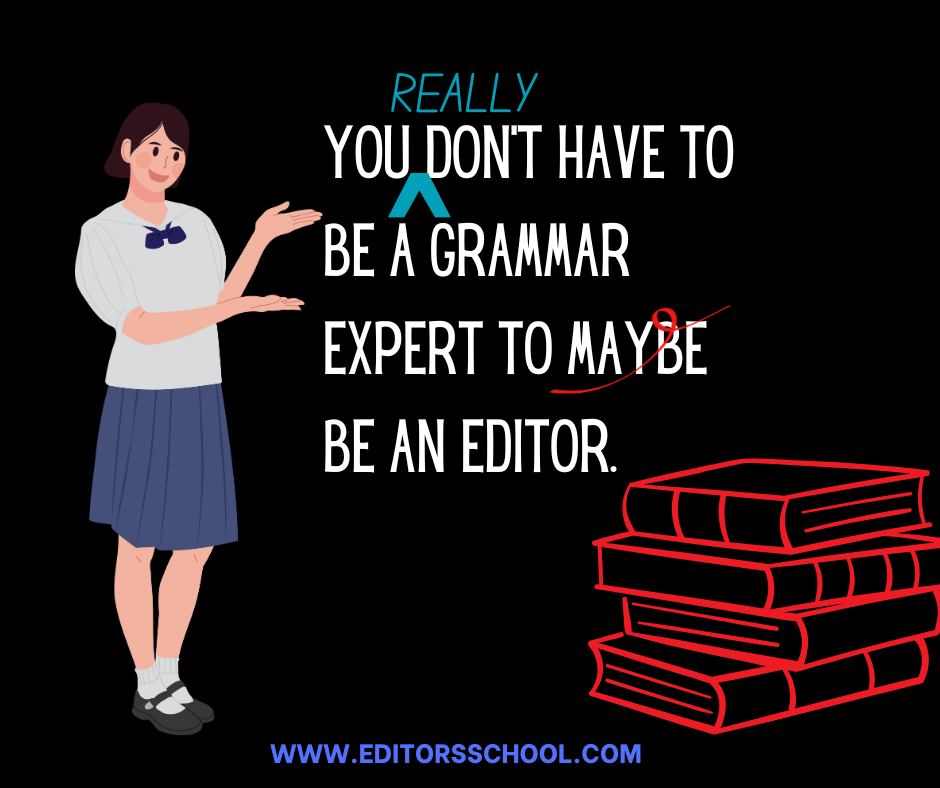
You Really Don’t Have to Be a Grammar Expert to Be an Editor
- Editors School Admin
- 0
- Posted on
Introduction
If you’ve ever worried, “I’d love to edit books, but I’m not a grammar expert,” you can stop worrying now.
It’s one of the biggest myths holding brilliant editors back and one of the easiest to dismantle. Here’s the truth: You really don’t have to be a grammar expert to be an editor.
In fact, many successful editors started with little more than a love of reading, a sharp eye for patterns, and the willingness to keep learning.
Busting The Myth
Editing isn’t about memorizing obscure rules or quoting The Chicago Manual of Style (affiliate link) from memory.
It’s about clarity. Flow. Connection.
Your job is to help the writer say what they mean in the most effective way possible.
Yes, grammar matters—but it’s a tool, not the destination.
Great editing is about more than grammar:
- helping a reader stay engaged
- preserving the author’s voice
- cleaning up confusion without crushing creativity
Grammar helps—but it’s not the only skill that counts.
What Actually Matters More Than Being a Grammar Expert
Curiosity and Coachability
If you’re willing to look things up, ask questions, and stay open to growth, you can be an editor.
You don’t have to know it all. You just have to want to keep getting better.
Pattern Recognition and Problem-Solving
Can you spot when something feels off—even if you’re not sure why?
Can you see inconsistencies in tone, pacing, or structure?
That’s editing gold.
Empathy for the Reader and the Author
Editors are translators between the writer and the reader.
You help ideas land, stories flow, and messages shine. That takes empathy far more than comma rules.
Familiarity with Style Guides
The Chicago Manual of Style? You don’t have to memorize it.
You just need to know how to use it.
Editors School teaches you when to look things up, what to bookmark, and how to apply style consistently.
Judgment and Communication Skills
You don’t need to “fix” every sentence.
You need to know when to step in, and how to suggest changes clearly and kindly.
That’s what builds trust with clients—and makes you someone they’ll hire again.
Tools Help—And You’ll Keep Learning as You Go
Let’s be honest:
Even seasoned editors use spellcheck, PerfectIt, Grammarly (with caution), and Google.
You are allowed to:
- Pause and look something up
- Reference a guide
- Take your time
You are not expected to be a machine.
You are expected to improve a manuscript. And yes—you can do that without being a grammar whiz.
What Grammar Does Matter—Eventually
As you grow, you’ll naturally start to internalize key grammar principles, like:
- Subject-verb agreement
- Comma usage
- Sentence clarity
- Paragraph flow
But here’s the secret:
You don’t need to master all of that before you begin. You’ll learn by doing, and every edit will sharpen your instincts.
Conclusion
Being a grammar expert is not a prerequisite for editing books.
If you care about helping authors communicate better, if you have an eye for clarity, and if you’re willing to grow—you’re ready to start.
Every great editor was once a beginner.
And most of us started out just like you: grammar-curious, not grammar-fluent.
TL;DR
You don’t have to be a grammar expert to be an editor. Curiosity, instincts, and clarity matter more. Grammar can be learned—and it often is, on the job.
FAQ
Q: What if I make a grammar mistake in my own writing?
A: Welcome to being human. That’s why we use tools, checklists, and self-review—nobody’s perfect, even the pros.
Q: Do I need to memorize the Chicago Manual of Style?
A: Definitely not. You need to reference it effectively. Editors School shows you how.
Q: Won’t clients expect me to be a grammar authority?
A: Clients want clean, clear writing. That doesn’t require perfection—just professionalism and a good process.
Q: What if I’m better at structure than commas?
A: That’s great! Many editors focus on developmental or line editing and collaborate with copyeditors.
Q: Can I still improve my grammar as I go?
A: Absolutely—and you will. The more you edit, the sharper your grammar skills will become.
Call to Action
Choose your CTA text from the options below (just hyperlink the one you like):
- Join Editors School to build the skills that actually matter—not just grammar rules
- Get our guide to Common Editing Mistakes (and How to Learn From Them)
- Explore your editing strengths with our “What Kind of Editor Are You?” Quiz